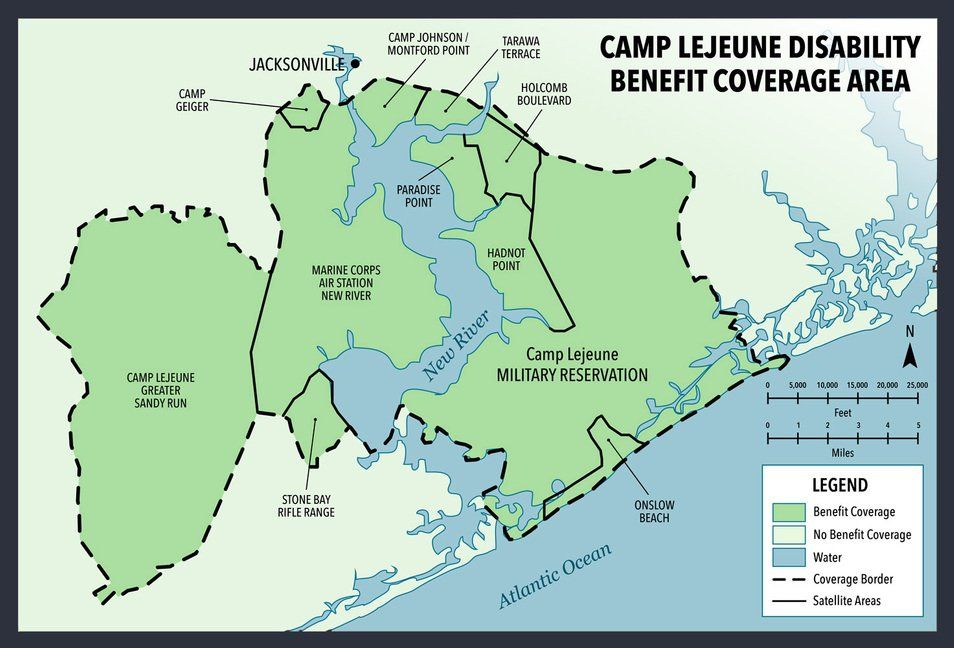CAMP LEJEUNE TOXIC WATER recovery
Almost one million people who lived or worked at the U.S. Marine Corps Camp Lejeune between 1953 and 1988 were exposed to highly contaminated toxic water.
MORE INFORMATION
UPDATE - August 10, 2022: President Joe Biden has signed the Camp Lejeune Justice Act of 2022 into law, allowing military service members and their families to seek compensation.
Military service members, their families, and civilian workers at Camp Lejeune drank, washed, and bathed with contaminated toxic water for decades. The full extent of injuries and illnesses caused by the hazardous toxic water at Camp Lejeune is still under investigation. The government was aware that the water had been contaminated with hazardous chemicals, but it took no action to mitigate the exposure to military service members and their families. If you or a family member lived or worked at Camp Lejeune for a total of at least 30 days between August 1953 and December 1987, and experienced illness or injury that might be related to contaminated water, you might be eligible for compensation. Call our law firm now for a free consultation with a lawyer to discover whether you might have a claim.

Tests from routine water treatment plant sampling and samples of water supply wells identified that trichloroethylene (TCE), tetrachloroethylene (PCE), vinyl chloride (VC), and benzene contaminated some drinking water sources at Camp Lejeune. They are all colorless chemicals. Health effects associated with these chemicals include:
• Aplastic anemia
• Bladder cancer
• Brain cancer
• Breast cancer
• Cardiac defects
• Cervical cancer
• Chonal atresia
• End-stage renal disease
• Esophageal cancer
• Eye defects
• Fetal death
• Hodgkins disease
• Impaired immune system function
• Kidney cancer
• Leukemia
• Liver cancer
• Liver cirrhosis
• Lung cancer
• Major malformations
• Miscarriage
• Multiple myeloma
• Myelodysplastic syndromes
• Neural tube defects
• Neurobehavioral performance deficits
• Neurological effects
• Non-Hodgkin lymphoma
• Oral cleft defects (including cleft lip)
• Ovarian cancer
• Parkinson disease
• Prostate cancer
• Rectal cancer
• Scleroderma
• Severe, generalized hypersensitivity skin disorder
• Soft tissue cancer
More details on the toxic water contamination at Camp Lejeune, as well as more information on the health effects of these drinking water contaminants, can be found at the Center for Disease Control's ATSDR website (atsdr.cdc.gov):
HHS / ATSDR: "Summary of the water contamination situation at Camp Lejeune."
HHS / ATSDR: "Health effects linked with trichloroethylene (TCE), tetrachloroethylene (PCE), benzene, and vinyl chloride exposure."
FREQUENTLY ASKED QUESTIONS
WHO IS AFFECTED?
If you served at U.S. Marine Corps Base Camp Lejeune or Marine Corps Air Station (MCAS) New River in North Carolina, you may have had contact with toxic contaminants in the drinking water there. Scientific and medical evidence has shown an association between exposure to these toxic contaminants and development of certain diseases later on. If you served in the military or worked at Camp Lejeune or MCAS New River for a total of at least 30 days from August 1953 through December 1987, you may be eligible for compensation.
HOW MANY PEOPLE ARE AFFECTED?
Thousands of families have already pursued justice, but as many as one million people were exposed to the contaminated toxic water at Camp Lejeune.
HOW DID THE WATER BECOME CONTAMINATED?
According to the U.S. Department of Health and Human Services' Agency for Toxic Substances and Disease Registry (ATSDR), in 1982, the U.S. Marine Corps discovered specific volatile organic compounds (VOCs) in the drinking water provided by two of the eight water treatment plants on base. Water from the Tarawa Terrace Water Treatment Plant was primarily contaminated by PCE (perchloroethylene or tetrachloroethylene). The source of the contamination was the waste disposal practices at ABC One-Hour Cleaners, an off-base dry cleaning firm. ATSDR estimated that PCE concentrations exceeded the current EPA maximum contaminant level of 5 ppb in drinking water from the Tarawa Terrace Water Treatment Plant for 346 months during November 1957-February 1987. The most contaminated wells were shut down in February 1985. Water from the Hadnot Point Water Treatment Plant was contaminated primarily by TCE (trichloroethylene). Other contaminants in the drinking water included PCE, benzene, TCE degradation products trans-1,2-DCE (t-1,2-dichloroethylene), and vinyl chloride. Supply wells were contaminated by multiple sources that included leaking underground storage tanks, industrial area spills, and waste disposal sites. ATSDR modeled the contamination and estimated that at least one VOC exceeded its current EPA maximum contaminant level in drinking water during August 1953 and January 1985.
HOW MUCH COMPENSATION AM I ENTITLED TO?
Because every situation is unique, it’s difficult to gauge the compensation you may receive without first speaking to a lawyer. Some factors that might affect the amount of compensation are the length of time spent at Camp Lejeune, the type of health effects suffered, and the severity of your illness or injury.
WHAT HAPPENS WHEN I RETAIN YOUR LAW FIRM?
Our law firm will investigate your claim free of charge, and we will recommend the best course of action to ensure that you obtain the maximum compensation for you and your family. Compensation is not guaranteed or immediate, and litigation might be required.
WHAT ARE MY NEXT STEPS?
Contact Snable Stevenson & Silva today for a free consultation. You can complete the form above or give us a call and we will schedule a time for you to speak with one of our attorneys, free of charge. The attorney will help to determine your eligibility, and inform you of your options to seek compensation.
FREE CASE EVALUATION
GET STARTED
Thank you for submitting a request.
Our team will follow up with you as soon as possible.
There was an error sending your message.
Please try again later.
(800) 266-0877 • attorneys@snablestevenson.com
(205) 582-8000 • 2737 Highland Ave South, Birmingham, AL 35205
(901) 474-2900 • 1545 Union Ave, Memphis, TN 38104
This website is an advertisement for legal services. No representation is made that the quality of the legal services to be performed is greater than the quality of legal services performed by other lawyers. Use of this website signifies your agreement to the Terms of Use, Privacy Policy, and Form Disclaimer.
Snable Stevenson & Silva L.L.C.

